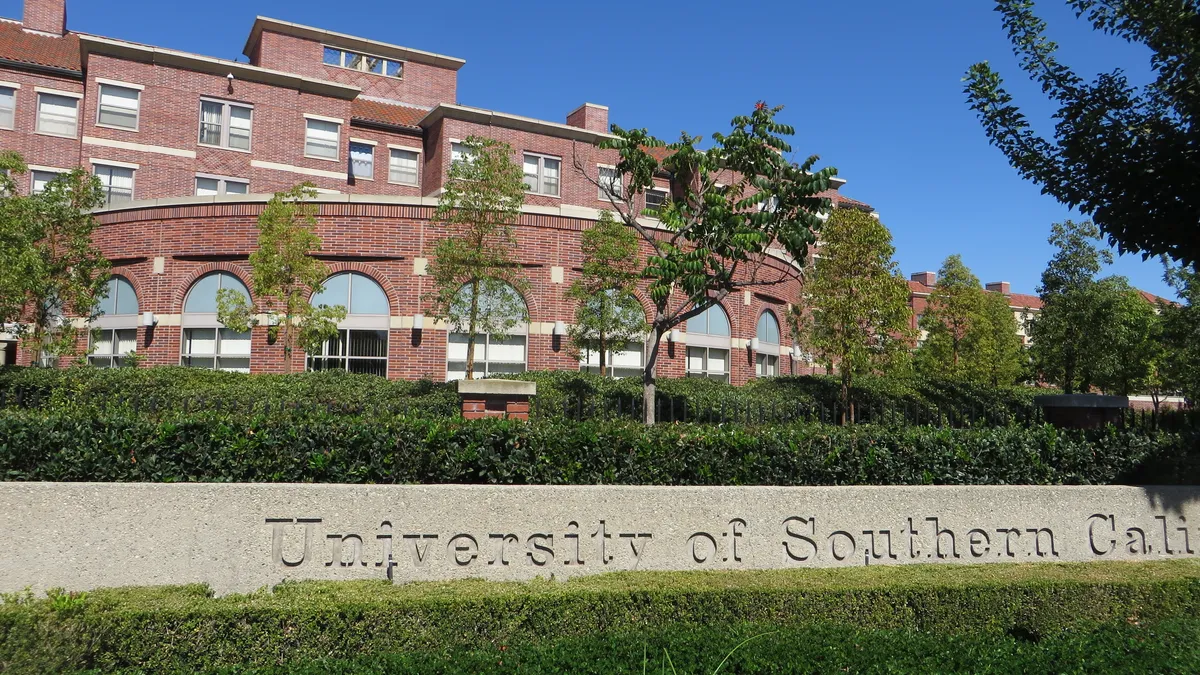Dive Brief:
- Carol Folt, previously chancellor of the University of North Carolina at Chapel Hill, will become president of the University of Southern California (USC) effective July 1.
- Folt was unanimously selected from more than 100 candidates after a seven-month search. In a statement, USC Board of Trustees Chair Rick Caruso called her a "principled leader with clarity of purpose and integrity to lead the university forward and upward."
- The news comes with USC in the hot seat after four members of its athletic department staff were implicated in an alleged nationwide conspiracy to buy prospective students' admission.
Dive Insight:
Folt's tenure at UNC-Chapel Hill came to a rocky close in January. With the campus fractured by debate over where to relocate the toppled Silent Sam Confederate statue, if at all, she ordered the removal of its base and descriptive tablets and announced she would step down at the end of the academic year.
That effectively eliminated support for one option on the table, which was to return the statue it its original location. Folt's decision came after decades-long tensions over the statue hit fever pitch and compromise with the board seemed tenuous. In response, the university system's Board of Governors moved up her departure to Jan. 31 — about two weeks after she made her announcement.
USC interim President Wanda Austin nods to those events in her statement on Folt's hiring, saying she has a record of "standing strong for the character and principles of a university's community."
That will be critical for USC, which has been batting off a series of high-profile scandals amid increasing academic prominence. Folt is replacing C.L. Max Nikias, who stepped down in August amid the fallout over allegations that a campus gynecologist abused hundreds of women, with whom USC settled for $215 million.
Allegations of improper behavior have plagued its medical school. Students recently sued USC and a former campus doctor over alleged sexual harassment. And in 2010, the NCAA handed down heavy sanctions on its athletics program, citing a lack of institutional control after players allegedly received improper gifts.
Nikias was brought on in the immediate wake of those sanctions, and during his time in office helped raise the profile of the university.
The latest admissions scandal, along with concerns over free speech, sexual harassment, tensions with governing boards and athletics' strong grip are just some of the issues college presidents today must be equipped to address. Those issues are also contributing to higher turnover among college chief executives.
Former UNC System President Margaret Spellings in October announced she would step down three years into her five year contract. Her time at UNC included political controversy and high turnover among the board as well as pushback from the governing body on the Silent Sam statue — the same issue that sparked Folt's departure.
Other institutions have seen leadership turn over after scandal. Michigan State University is still looking for a replacement for ex-President Lou Anna Simon after its interim president resigned earlier this year over insensitive remarks about victims of Larry Nassar. Simon faces charges of lying to police about her knowledge of Nassar's abuses.
And the University of Maryland, College Park is likely gearing up its presidential search. Its current head, Wallace Loh, initially planned to step down at the end of the academic year following turmoil in the university's athletics department. He later decided to extend his tenure through June 2020 to help with the leadership transition.









